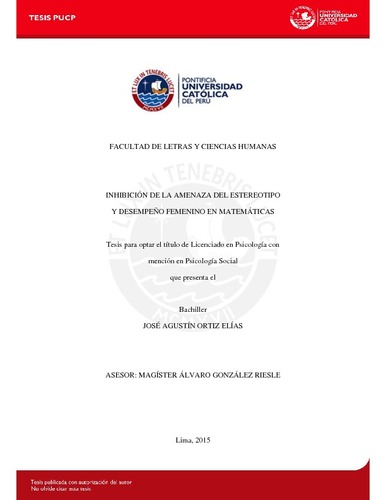| dc.contributor.advisor | González Riesle, Álvaro | es_ES |
| dc.contributor.author | Ortiz Elías, José Agustín | es_ES |
| dc.date.accessioned | 2016-03-10T15:28:08Z | es_ES |
| dc.date.available | 2016-03-10T15:28:08Z | es_ES |
| dc.date.created | 2015 | es_ES |
| dc.date.issued | 2016-03-10 | es_ES |
| dc.identifier.uri | http://hdl.handle.net/20.500.12404/6588 | |
| dc.description.abstract | La Amenaza del Estereotipo es la tensión psicológica que experimenta una persona que rinde una evaluación en circunstancias en que su desempeño puede ser juzgado mediante un estereotipo negativo acerca de la habilidad del grupo social al que pertenece (étnico, de género, socioeconómico, etc.). Diversos estudios han demostrado que el estereotipo que dice que las mujeres no tienen la misma capacidad para las matemáticas y las ciencias que los hombres está ampliamente difundido y tiene profundos efectos en el desempeño académico de las mujeres en pruebas de matemáticas, en el aprendizaje de las habilidades relacionadas con las matemáticas y las ciencias y en su interés vocacional por las carreras de ciencias e ingeniería, así como en su tasa de abandono de los estudios en ellas. Los supuestos de la teoría de la Amenaza del Estereotipo no han sido contrastados empíricamente en el Perú. La presente investigación examina su presencia entre alumnas peruanas que inician la educación superior. También se ponen a prueba tres métodos para inhibir sus efectos, basados en la reinterpretación de la ansiedad, el uso de modelos de rol exitosos y la autoafirmación. Finalmente, se evalúa el efecto mediador de la ansiedad y el esfuerzo. Los resultados demuestran los efectos de la Amenaza del Estereotipo y la eficacia de los tratamientos, resaltan la importancia de comprender el impacto de esta variable sobre la capacidad de las mujeres en matemáticas y de aplicar tratamientos que contribuyan a la equidad de género y de oportunidades en la educación superior peruana. | es_ES |
| dc.description.abstract | Stereotype threat is the psychological distress experienced by an individual who takes a test or a formal assessment under circumstances where his or her performance could be interpreted using a negative stereotype about the skills of his/her social group (ethnic, gender, socioeconomic, etc.). Different empirical studies have demonstrated that the negative stereotype about women’s supposed lesser skills in mathematics and sciences in comparison to men, is widely spread and has the deepest consequences in women’s academic performance, learning of scientific abilities, and their vocational interest on engineering and science’s disciplines, including their dropout level from those majors. Stereotype Threat Theory has not been empirically tested in Peru. This research tests its presence among Peruvian women students at the beginning of higher education. Additionally, it tests in practice three methods for the inhibition of Stereotype Threat’s academic effects: the reappraisal of anxiety and stress, the exposition to successful role-models, and self-affirmation. Finally, analyses are performed to test the mediator effect of anxiety and effort. The results demonstrate the effects of Stereotype Threat and the efficacy of the inhibitory methods. They emphasize the importance of understanding the effects of this variable on women’s mathematical abilities, and the importance of using treatments for the enhancement of gender equity in opportunities in Peruvian higher education. | es_ES |
| dc.language.iso | spa | es_ES |
| dc.publisher | Pontificia Universidad Católica del Perú | es_ES |
| dc.rights | Atribución-NoComercial-SinDerivadas 2.5 Perú | * |
| dc.rights | info:eu-repo/semantics/openAccess | es_ES |
| dc.rights.uri | http://creativecommons.org/licenses/by-nc-nd/2.5/pe/ | * |
| dc.subject | Estereotipo (Psicología) | es_ES |
| dc.subject | Género | es_ES |
| dc.subject | Matemáticas--Estudio y enseñanza | es_ES |
| dc.title | Inhibición de la amenaza del estereotipo y desempeño femenino en matemáticas | es_ES |
| dc.type | info:eu-repo/semantics/bachelorThesis | es_ES |
| thesis.degree.name | Licenciado en Psicología Social | es_ES |
| thesis.degree.level | Título Profesional | es_ES |
| thesis.degree.grantor | Pontificia Universidad Católica del Perú. Facultad de Letras y Ciencias Humanas | es_ES |
| thesis.degree.discipline | Psicología Social | es_ES |
| renati.discipline | 313066 | es_ES |
| renati.level | https://purl.org/pe-repo/renati/level#tituloProfesional | es_ES |
| renati.type | http://purl.org/pe-repo/renati/type#tesis | es_ES |
| dc.publisher.country | PE | es_ES |
| dc.subject.ocde | http://purl.org/pe-repo/ocde/ford#5.01.00 | es_ES |






